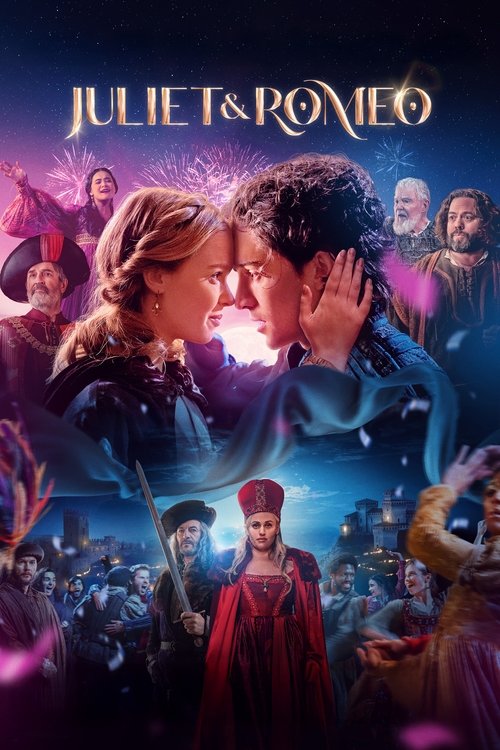
Ask Your Own Question
What is the plot?
The film opens in the sun-bleached streets of Verona Beach, where the long-standing rivalry between two construction empires shapes daily life. The Montagues and the Capulets run competing firms that dominate the skyline with cranes and towered scaffolds; their leaders, the elder Montague and the elder Capulet, preside over deals, payrolls and grudges that have hardened into a public feud. In this modernized city, bladed weapons have become designer firearms--brands called Swords, Daggers and Rapiers appear in ads and storefronts--yet the bitterness between the families remains old as stone. Romeo Montague, the Montagues' only son, grows up amid this hostile atmosphere, and Juliet Capulet, the Capulets' only daughter, is reared as the focal point of her family's expectations. Both young people live in a climate where business rivalries spill into the streets and family honor translates into corporate dominance.
A Capulet celebration at a beachfront mansion provides the immediate spark that propels the plot. The Capulets stage a lavish party with music, lights and clients from the local construction industry, and Romeo and his friends obtain invitations to the event, slipping inside despite the hostiles between the houses. At the party Romeo moves through the crowd and stops when he encounters Juliet across the room. They speak, and their conversation unfolds quickly: they exchange a few words, share a near-immediate physical intimacy and fall in love at first sight. As they lean toward one another on the terrace above the surf, the attraction is unmistakable; neither knows the other's family identity during their first meeting. When a Capulet cousin, Tybalt, notices Romeo's presence he reacts violently to the interloper at his relatives' celebration and swears vengeance for what he perceives as an insult to the household. The party ends with tension as Tybalt's fury simmers; Romeo and Juliet separate, each shaken and changed by the encounter.
That same evening Romeo returns to find Juliet alone on the Capulet property. They meet again beneath a balcony and speak at length, confessing love and making plans. Despite her family's intent to marry her to her father's business partner, Juliet and Romeo commit to one another and agree to marry within twenty-four hours. Their decision is abrupt but deliberate: they want to bind themselves legally before outside arrangements can be forced upon Juliet. Father Laurence, the local priest and an acquaintance of Romeo's from the neighborhood, agrees to perform the ceremony in secret. The following morning, the priest conducts a brief, clandestine marriage ceremony in a small room away from both households. Only one of Romeo's cousins and Juliet's servant stand as witnesses to the exchange of vows; no public announcement follows. After the marriage the two leave with the private knowledge that they are husband and wife, but every street and office in Verona Beach remains still divided by the feud.
The conflict flares at midday when Tybalt stalks the streets looking for Romeo to retaliate for the insult at the party. He expects a duel with Romeo but instead finds Mercutio, Romeo's outspoken friend, on the same block. Mercutio confronts Tybalt because he sees Tybalt's search as a direct threat to Romeo, and the situation escalates into a confrontation in an alley. Mercutio challenges Tybalt verbally and then engages him in a gunfight. During their exchange Tybalt shoots Mercutio; the shot strikes Mercutio and he collapses, gravely wounded. Romeo arrives on the scene moments after the wound is inflicted. Seeing his friend bleeding and dying, Romeo's grief swells into fury. He lunges at Tybalt and fires, killing Tybalt with a single, fatal shot. The two deaths occur in quick succession: Tybalt's bullet kills Mercutio in the alley, and Romeo's return shot kills Tybalt before Tybalt can escape. The city's law enforcers intervene; Police Chief Prince, the civic authority, arrives at the scene, witnesses the bodies and exercises his authority over the violence.
Prince responds to the killings by issuing a punishment that removes Romeo physically from Verona Beach. He convicts Romeo for Tybalt's death and orders him banished from the city limits. The sentence forces Romeo into exile; officers escort him away from his family home and he departs the town that same day. Juliet receives word of the disturbance and learns that Romeo has killed Tybalt. When she next speaks with those around her she hears conflicting reports--some say Romeo acted in defense of Mercutio; others accuse him of cold-blooded murder--but she only knows that her new husband has been forced to leave. Juliet is distraught: she has been separated from the man she just married and remains under pressure from her parents to accept a marriage to her father's business partner. The idea of marrying that partner now appears intolerable to her; she contemplates suicide and declares to her nurse and to Father Laurence that she cannot live without Romeo. The Capulet household intensifies plans for the arranged marriage even as Juliet resists.
Father Laurence, who has befriended Romeo and understands the young couple's desperation, sits with Juliet and proposes a drastic stratagem. He supplies Juliet with a medical sedative disguised as a potion: a drug that will induce a deathlike coma by slowing her breathing and cooling her skin so she will appear dead to observers. Laurence explains the plan in detail: Juliet will take the potion before the arranged wedding ceremony so that her family will find her apparently lifeless and postpone the marriage, allowing the Capulets to place her in their family crypt. While Juliet is meant to lie in the tomb for a period, Laurence will send a sealed message to Romeo explaining the ruse and arranging for Romeo to retrieve her once she revives. The priest promises that if they time the sequence properly Juliet can wake in Romeo's arms away from Verona Beach and the arranged marriage will be thwarted.
Juliet agrees and drinks the potion at the appointed time. She slips into the deep, artificial sleep, and when her body is discovered the Capulet household assumes she has died. They hold a funeral and carry her to the family crypt, placing her on a marble slab beneath the vaults as her relatives grieve. Father Laurence dispatches a letter to Romeo that lays out the plan: it describes the sedative, explains the timetable and instructs Romeo where to meet Juliet once she awakens. Laurence entrusts the missive to a messenger and expects it to reach Romeo during his banishment.
However, the communication fails to arrive on time. Rumors begin to circulate through Verona Beach that Juliet has died. A distraught Romeo, mistakenly informed by a misinformed courier and by his servant who has returned to town, hears that Juliet is dead; he interprets Juliet's apparent passing as final. Distracted by grief and pressed by the urgency of the rumor, Romeo secures poison earlier that day from a small vendor outside the city--he obtains a lethal vial because he intends to join Juliet in death rather than live apart. Having procured the vial, he sneaks back into Verona Beach under cover of night and makes his way to the Capulet tomb.
At the tomb Romeo enters the family crypt and finds Juliet lying motionless on the stone slab, pale and still beneath a shroud. Without verifying more than the outward signs of death, he kneels, cradles her and believes that the love that bound him to her can only be fulfilled beyond life. He uncorks the vial he took earlier and drinks the poison; its effects begin quickly. As the toxin works through him his face slackens, and his heartbeat slows. In the moments after Romeo swallows the poison Juliet's induced slumber breaks. The sedative's effects recede, and Juliet awakens to find Romeo breathing shallowly beside her. She sees the vial in his hand and watches him convulse and go limp as the poison takes hold. Grief transforms into immediate action: with Romeo dying at her side and no hope of medical aid in the sealed crypt, Juliet takes Romeo's gun--brought with him or kept at his person--and points it to herself. She pulls the trigger, shooting herself through the chest, and collapses next to Romeo. The two lovers die in the tomb within moments of one another: Romeo from the ingested poison and Juliet from the gunshot wound.
The Capulets and Montagues discover the bodies shortly thereafter when servants and family members open the tomb to perform traditional rites and find Romeo and Juliet lying together. They pull the corpses from the crypt, laid out in the dim vault beneath the family mausoleum. Police Chief Prince appears at the scene, escorted by officers, and observes the two dead young people. He addresses the assembled family leaders, the elder Capulet and the elder Montague, and admonishes them in the presence of their respective kin and business associates. Prince tells them that the bloodshed and the long-standing vendetta between the families have culminated in the deaths of their only children. He holds the two patriarchs accountable for the circumstances that produced the fatal sequence of events: the party incursion, Tybalt's search for Romeo, Mercutio's death by Tybalt's shot, Romeo's retaliatory killing of Tybalt, the ensuing exile, Father Laurence's secretive plan and the misdelivered information that led Romeo to believe Juliet had died. In the tomb under Verona Beach the officials lay the lovers' bodies out for inspection, and their deaths stand as the final, specific outcome of each violent and clandestine choice made in the preceding days.
The film closes with the bodies being removed from the crypt and the families gathered in the cemetery, where Prince's words echo over the courtyard. He reminds the Capulets and Montagues that their feud has produced these fatalities: Mercutio is dead because Tybalt shot him during the alley confrontation; Tybalt is dead because Romeo shot him in retaliation; Romeo dies after ingesting poison he had bought and consumed upon finding Juliet apparently dead; and Juliet dies by shooting herself with Romeo's gun after awakening and seeing Romeo succumb to the poison. The camera lingers on the two corpses as mourners surround them and city officials record the scene. The last frame depicts the two bodies side by side as the assembled adults look on, and Police Chief Prince attributes the chain of deaths directly to the families' hatred and to the decisions that grew out of it. The film ends on this scene in the Capulet tomb, with the lovers' deaths presented as the conclusive outcome of the feud and the clandestine measures undertaken to defy it.
What is the ending?
The ending of Juliet & Romeo (2025) unfolds with a twist away from the original Shakespearean tragedy: both Juliet and Romeo take poison, which only slows their hearts instead of killing them outright. After their families and others believe them dead and hold a funeral, they are given an antidote and ultimately survive, allowing them to live happily ever after.
Expanded narrative of the ending scene by scene:
-
The film begins with what appears to be a funeral, setting a somber tone where Romeo and Juliet are mourned as deceased lovers.
-
As the story progresses and climaxes, both Juliet and Romeo consume poison, a pivotal moment symbolic of their desperate escape from their families' enmity and oppressive circumstances.
-
However, unlike Shakespeare's version, this poison only slows their heartbeats rather than causing death.
-
When their families and friends gather, believing them to be dead, the narrative reveals that Juliet and Romeo's states are reversible.
-
Medical help or some form of antidote is administered off-screen or quietly implied, reviving them from their deathlike states.
-
The film closes with the couple awakening and embracing their survival, signifying a happy ending not present in the original play.
-
This ending redefines the traditionally tragic consequences of their love and symbolizes a more hopeful resolution to their conflict and family feud.
In this retelling, the movie consciously departs from Shakespeare's original fatal ending to provide a modernized conclusion wherein the lovers live, emphasizing survival over sacrifice.
Who dies?
In the movie "Juliet & Romeo" (2025), both Juliet and Romeo take a poison that simulates death by greatly slowing their heart rates. They must receive an antidote in time to survive, and the antidote administration is quite tense and close-timed. Although it looks like they die, their deaths are actually simulated by the poison and not permanent unless the antidote is not given quickly enough.
The film culminates in a situation reminiscent of the classic Shakespearean ending, where the lovers' apparent deaths cause great drama, although in this adaptation, the deaths are initially feigned through the use of the poison. There is no direct mention that other characters die in this version; the plot focuses mainly on the lovers and their family conflict.
This modernized retelling diverges from Shakespeare's original Romeo and Juliet, where other deaths like Paris, Tybalt, and Mercutio occur, and Romeo and Juliet do definitively die by poison and suicide, respectively. However, in the 2025 film, the lovers' apparent deaths are due to the poison that mimics death, and thus the mechanism and implications differ from the original text.
Summary of key deaths or near-deaths in the 2025 film:
- Juliet and Romeo: Both take a poison simulating death (by slowing heart rate). If not treated with antidote, the poison would kill them; their fate depends on timely intervention.
- No other main characters are reported dead in the film based on the search results. The story emphasizes the near-death experience due to the poison and its effects rather than multiple literal deaths.
Therefore, the 2025 Juliet & Romeo features the lovers undergoing a life-threatening event involving poison, but they do not actually die in the same way as in Shakespeare's original play.
Is there a post-credit scene?
The movie Juliet & Romeo (2025) does not have any publicly documented post-credit scene. None of the detailed reviews, summaries, or official descriptions mention a post-credit scene or provide a description of such a scene. Additionally, a specific search for "Juliet's post-credit scene" related to this film yields no relevant results indicating one exists. Therefore, it is safe to conclude that Juliet & Romeo (2025) does not feature a post-credit scene.
What are the key differences in how Juliet and Romeo meet in the 2025 film compared to the original play?
In the 2025 film "Juliet & Romeo," the titular lovers meet very early in the story with full knowledge of each other's family names, unlike the original play where they meet at a masked ball unaware of each other's identities.
How does the film portray the use of the poison that simulates death?
In the film, both Juliet and Romeo take a poison that slows their heart rate to simulate death. They are warned that if they do not receive an antidote in time, they will die. The apothecary who provides the potion demonstrates its effects on rats and mentions using it to help Jews escape the country.
What role does Juliet's family play in her future and marriage in the film?
Juliet's parents arrange for her to be married to a stranger without her knowledge or consent, treating her somewhat like property. Juliet pleads with her mother for the freedom to choose her own future, but her mother denies this, reminding Juliet that she herself had no say in her own future. The arranged marriage is also a strategic move to protect the family amid impending war.
How is Shakespeare's original language treated in the 2025 film?
Shakespeare's poetic language is largely removed from the film, appearing only in referential and mostly comedic ways. For example, Mercutio misquotes a famous line, asking "Where the hell are thou Romeo?" instead of the original "wherefore" meaning "why." The film uses modern dialogue and pop songs instead.
What are some notable character or plot changes in the 2025 film adaptation?
The film remixes or alters many story beats: the lovers meet early with full knowledge of their identities, the story is set against the backdrop of the Italian Renaissance and wars, and it is presented as a musical with modern pop songs. Familiar characters like Mercutio and Tybalt appear, but the plot includes new elements such as the apothecary's role and a more explicit depiction of family conflict and arranged marriage.
Is this family friendly?
The 2025 movie Juliet & Romeo is rated PG-13, primarily due to its depiction of some violence, bloody images, and suggestive material, which means caution is advised for children and sensitive viewers.
Potentially objectionable or upsetting content includes:
-
Violence: Several fight scenes featuring punching, pushing, kicking, and bloodied injuries, primarily involving young characters connected to the family feuds; while these are not necessarily to the death, they are intense enough to be notable.
-
Blood and Injury: Some scenes involve bloody injuries sustained during fights, which may be disturbing for younger or sensitive viewers.
-
Suggestive Material: There are romantic interactions such as passionate kisses and some scenes involving secret meetings of the young lovers, which might be mature for younger children.
-
Emotional Intensity: The film involves themes of family conflict, secret love, and death (including suicide of the titular characters), which might be upsetting or heavy for younger audiences or anyone sensitive to tragic themes.
-
Language and Behavior: The film includes moderate language and some characters displaying immature or brash behavior, including a key religious figure appearing intoxicated and complex discussions about faith and morality.
In summary, the movie is not recommended for very young children or sensitive viewers without parental guidance due to its sequences of violence, suggestive romance, and emotional heaviness, although it may be suitable for older teens and adults willing to engage with these themes cautiously.






































